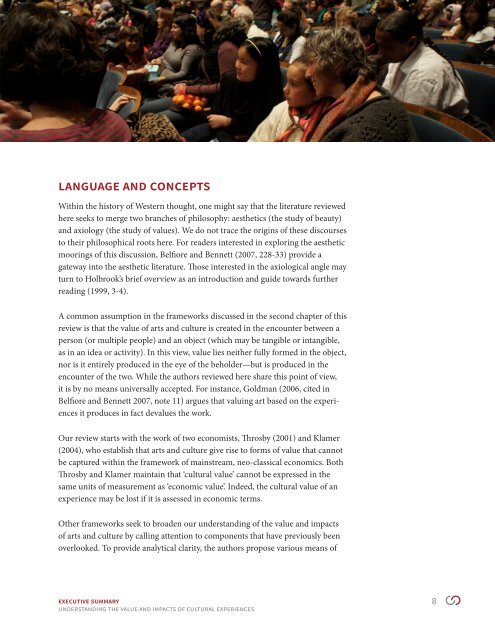aceUVi
aceUVi
aceUVi
You also want an ePaper? Increase the reach of your titles
YUMPU automatically turns print PDFs into web optimized ePapers that Google loves.
Language and concepts<br />
Within the history of Western thought, one might say that the literature reviewed<br />
here seeks to merge two branches of philosophy: aesthetics (the study of beauty)<br />
and axiology (the study of values). We do not trace the origins of these discourses<br />
to their philosophical roots here. For readers interested in exploring the aesthetic<br />
moorings of this discussion, Belfiore and Bennett (2007, 228-33) provide a<br />
gateway into the aesthetic literature. Those interested in the axiological angle may<br />
turn to Holbrook’s brief overview as an introduction and guide towards further<br />
reading (1999, 3-4).<br />
A common assumption in the frameworks discussed in the second chapter of this<br />
review is that the value of arts and culture is created in the encounter between a<br />
person (or multiple people) and an object (which may be tangible or intangible,<br />
as in an idea or activity). In this view, value lies neither fully formed in the object,<br />
nor is it entirely produced in the eye of the beholder—but is produced in the<br />
encounter of the two. While the authors reviewed here share this point of view,<br />
it is by no means universally accepted. For instance, Goldman (2006, cited in<br />
Belfiore and Bennett 2007, note 11) argues that valuing art based on the experiences<br />
it produces in fact devalues the work.<br />
Our review starts with the work of two economists, Throsby (2001) and Klamer<br />
(2004), who establish that arts and culture give rise to forms of value that cannot<br />
be captured within the framework of mainstream, neo-classical economics. Both<br />
Throsby and Klamer maintain that ‘cultural value’ cannot be expressed in the<br />
same units of measurement as ‘economic value’. Indeed, the cultural value of an<br />
experience may be lost if it is assessed in economic terms.<br />
Other frameworks seek to broaden our understanding of the value and impacts<br />
of arts and culture by calling attention to components that have previously been<br />
overlooked. To provide analytical clarity, the authors propose various means of<br />
Executive Summary 8<br />
UNDERSTANDING the value and impacts of cultural experiences


